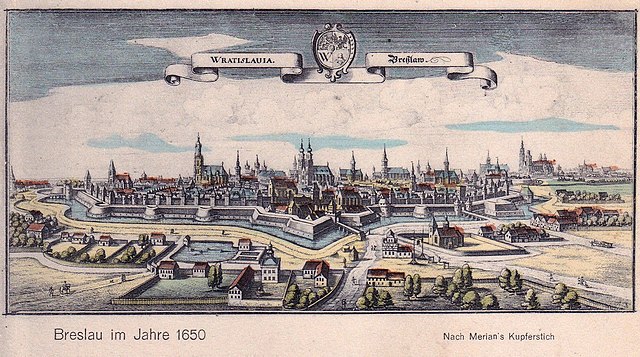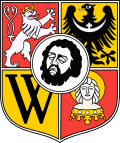Wrocław
city in the Lower Silesian Voivodeship, southwestern Poland, and historical capital of Silesia From Wikipedia, the free encyclopedia
Remove ads
Wrocław (Polish: [ˈvrɔt͡swaf] (![]() listen);[a] German: Breslau,[b] pronounced [ˈbʁɛslaʊ̯] (
listen);[a] German: Breslau,[b] pronounced [ˈbʁɛslaʊ̯] (![]() listen); Lower Silesian: Brassel)[4] is the biggest city in Lower Silesian Voivodeship in the southwest part of Poland. The German name of the city is Breslau, and the Czech name is Vratislav. The Oder River goes through the city. There are also 4 other small rivers which connect with the Oder River in the territory of the city: Bystrzyca, Oława, Ślęza and Widawa. Before World War II there were 303 bridges in the city; now there are about 220. In Latin it is called "Vratislavia".
listen); Lower Silesian: Brassel)[4] is the biggest city in Lower Silesian Voivodeship in the southwest part of Poland. The German name of the city is Breslau, and the Czech name is Vratislav. The Oder River goes through the city. There are also 4 other small rivers which connect with the Oder River in the territory of the city: Bystrzyca, Oława, Ślęza and Widawa. Before World War II there were 303 bridges in the city; now there are about 220. In Latin it is called "Vratislavia".
Remove ads
Remove ads
History

Wrocław is over 1000 years old. It was originally a Slavic town. During the Middle Ages it became a German city, but before that Wrocław was a Czech city. It was called Breslau for a long time. During the Second World War the city was badly damaged. About 70% of the buildings were damaged. Many of them were rebuilt. After the war, the city became Polish, and the German citizens were forced to leave. It has been called by its Polish name Wrocław ever since.
Johannes Brahms wrote his Academic Festival Overture to thank the University of Breslau in Wrocław. This was for an honorary doctorate he was awarded by the university.[5]
Remove ads
Modern Wrocław
Its population in 2004 was 638,000. There are 10 universities in the city. It is famous for its beautiful historical town square (Polish rynek) and cathedral (large church).
In 1997 the Oder River flooded, causing a lot of damage.
Nobel Prize winners from Wrocław
10 people from Wrocław have won the Nobel Prize. They are:
- Theodor Mommsen (1902)
- Philipp Lenard (1905)
- Eduard Buchner (1907)
- Paul Ehrlich (1908)
- Gerhart Hauptmann (1912)
- Fritz Haber (1918)
- Friedrich Bergius (1931)
- Otto Stern (1943)
- Max Born (1954)
- Reinhard Selten (1994)
Notes
- English pronunciation:
- Latin: Vratislavia or Wratislavia.
References
Other websites
Wikiwand - on
Seamless Wikipedia browsing. On steroids.
Remove ads












